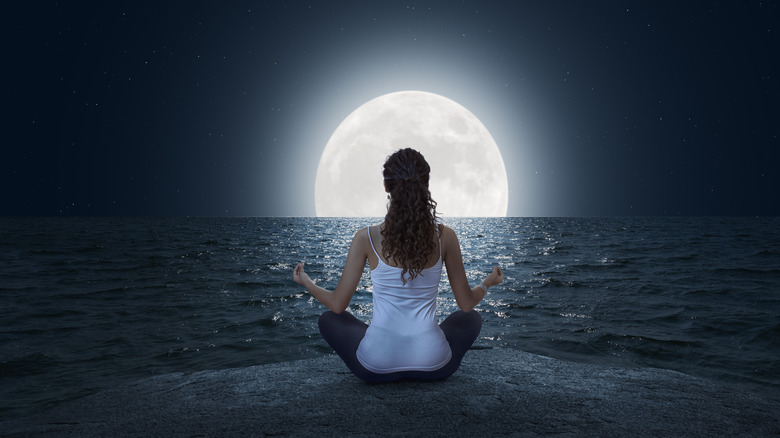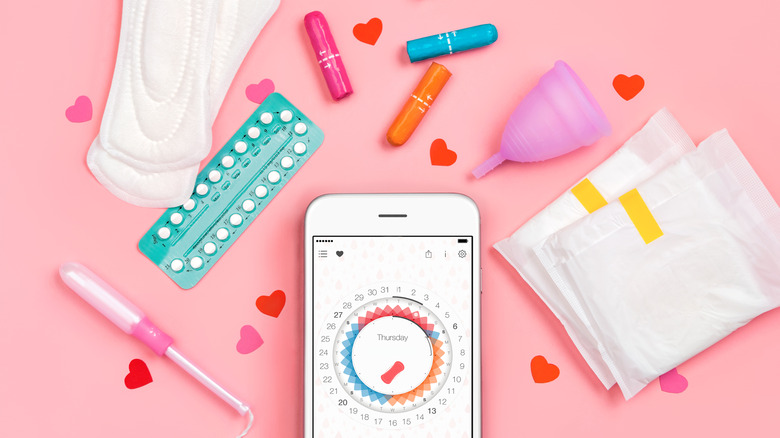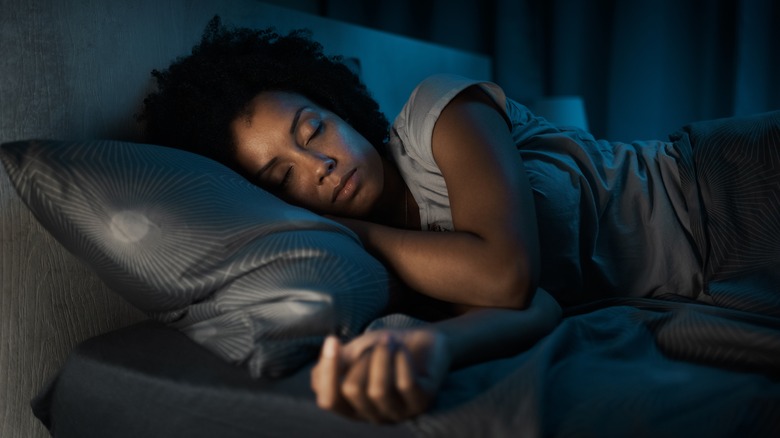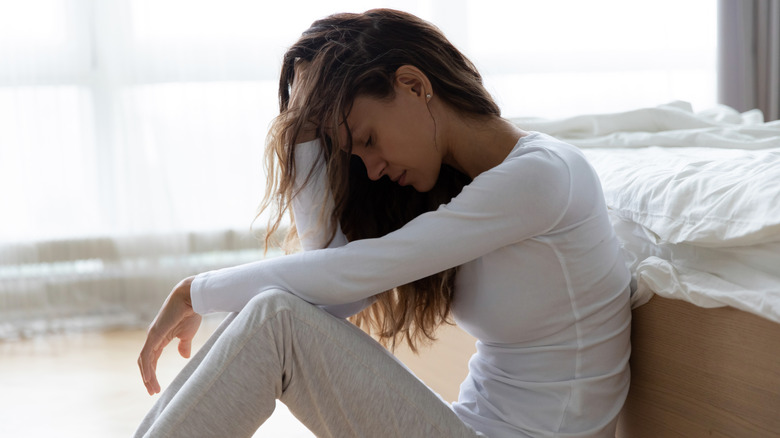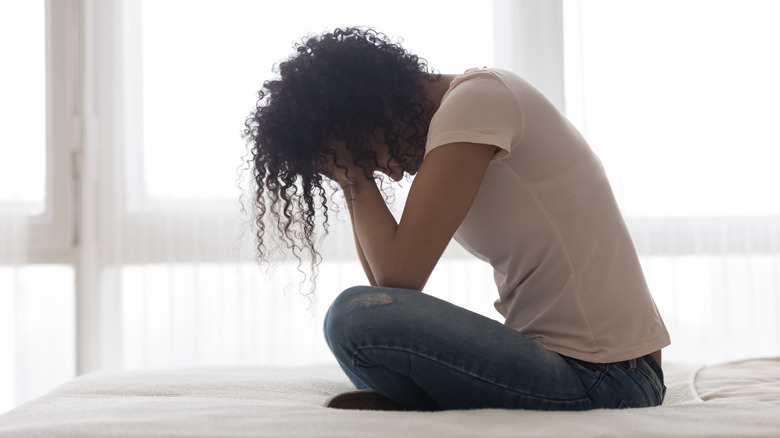Here's How The Moon Can Actually Affect Your Health
When it comes to the moon, many people don't give it much thought, apart from the phases it goes through every month (such as how a full moon transpires roughly every 29 days). Still, a lot of us have heard theories about the moon's ability to alter our health — both mentally and physically. But is that a myth, or is there scientific evidence to actually prove it?
When you stop to think that the moon is the earth's only natural satellite and that it's relied upon to help keep the planet stabilized, it's not a stretch that it would affect us on a more personal level, too. In fact, believe it or not, one study revealed that a little over 80% of mental health professionals wholeheartedly feel that the moon has the power to make us ill!
So, let's dive into it, shall we? Let's explore some of the ways the moon is said to affect us — purely from a scientific standpoint — to separate fact from fiction.
The lunar cycle may have an impact on heart health
Back in the 1970s, a scientific paper cited that, just as the moon has a profound effect on water, it can also alter the way blood flows in our bodies. However, when we consider all the research that's been conducted since, scientists are not as certain whether the moon has an influence on our blood circulation and heart rate. The research since has been a bit of a mixed bag.
A 2013 study discovered it's not uncommon for the heart rate and blood pressure in men to significantly drop during full and new moons. According to another study, if you need to undergo heart surgery, doing it during a full moon can increase your chances of survival and even shorten your stay at the hospital. Still, other reports say the moon has little effect on the heart as it relates to athletic performance overall.
When it comes to this point, maybe erring on the side of caution is the best route to take. After all, it's better to take some of the founded research seriously and be pleasantly surprised it was right. Right?
The moon may even affect your menstrual cycle
Menstrual cycles are often tied to the phases of the moon because, while a full moon occurs every 29 days, a menstrual cycle generally repeats itself every 28 days. And, while some data suggests that women who have cycles of over 27 days have a strong potential to "link up" with the moon's cycles (and the gravitational pull that comes from them), there's a greater chance that any noticeable changes in your cycle has more to do with your hormonal changes than the moon itself.
And, what about ovulation? Does the moon have any effect on it? The Scientist reveals that ovulation occurs around 12 days before a woman's period begins. This means that if her period is scheduled to start around a full moon, she will probably ovulate around a new moon. On the flip side, women whose cycles tend to occur around the new moon will ovulate during the full moon (via Medical News Today). Interestingly enough, a large majority of women actually do.
Plus, a woman's temperature tends to slightly increase (by around 0.5%) when ovulation occurs during a full moon (compared to when no moon is visible); this actually makes it more likely that they will conceive a son instead of a daughter. Some studies also say there is an increase in births during a full moon (again, due to its gravitational pull), although there is still plenty of research being done on the topic.
The phases of the moon could impact your sleep patterns
Since a whopping 50 to 70 million people struggle on some level to get an adequate amount of sleep, you might find it fascinating how the moon can affect one's quality of rest. If you find it to be coincidental that, in the days leading to a full moon (and/or the days immediately after), you have a hard time either falling or staying asleep, there is actually some science to support this.
Science reveals it's not uncommon to take an extra five minutes to fall asleep around the time of a full moon. Additionally, you may also sleep for 20 minutes less and even get 30% less of deep (REM) sleep, too. Some researchers say that the extra bright light may play a direct role. Whatever the case may be, it can't hurt to invest in a blackout curtain — even if you only use it during a full moon.
The moon may disrupt your circadian rhythm and mess with your mental health
The way your body responds to light and darkness is where the studies on circadian rhythm come from. Probably the simplest way to explain circadian rhythm is that it describes the physical, mental, and even behavioral cycles we go through in any 24-hour period as it directly relates to light and darkness. When your circadian rhythm is destabilized in any way, per a study published in Translational Psychiatry, symptoms directly associated with depression, bipolar disorder, and, some say, even anxiety can increase.
So, if you're someone who finds yourself doing a bit more overthinking, feeling especially antsy while you're trying to relax, or you're worrying more than usual, you might want to look out the window to check for a full moon. Because, even if all it's doing is preventing you from getting a few extra zzz's, this could be enough to trigger you on other levels, too. Wow, who knew?
The moon may even play a role in the development of kidney stones
If you've never had a kidney stone before, consider yourself extremely fortunate because anyone who's had them can vouch that passing them can be very uncomfortable (to say the least).
According to WebMD, kidney stones form when minerals like calcium and uric acid become too concentrated, turn into crystals, and then develop into little stones. People who don't have enough fluid in their system are typically the most vulnerable to getting them. If you're wondering what all of this even remotely has to do with moon cycles, believe it or not, there is research to support that kidney stones can actually become more painful when a full moon is in sight.
You can't really control getting a kidney stone around a full moon. Mayo Clinic says that all you can do is heed the advice of your doctor, take pain relievers, drink plenty of water (and grapefruit juice), per Healthline, and hope for them to pass as swiftly as possible. But, if the pain is especially alarming and there is a full moon, the two could very well be connected.
Some studies show that a full moon can impact the likelihood of experiencing an accident
Know any clumsy people or erratic drivers? If so, you might want to tell them to take it easy around a full moon. While one study revealed that motorcycle accidents increase as much as 5% during a full moon, another stated that 40% of medical professionals think that moon cycles can have a direct cause on bizarre and unusual behavior. Interestingly enough, another science-based report published in Science of the Total Environment (via Science Direct) claims there is even an uptick in ambulances called to the scene of traffic accidents in the days leading up to a full moon.
While none of this should make you paranoid, it should make you aware that it's quite possible the moon can cause you to feel a bit more anxious and erratic than you would typically be. And, again, if folks aren't getting enough quality rest, this can lead to some clumsiness and erratic behavior — whether the moon is full or not.
Studies show that nonepileptic seizures may be more likely to occur during a full moon
According to the Epilepsy Foundation, there are three main kinds of seizures: generalized onset seizures, focal onset seizures, and unknown onset seizures. Generalized ones affect both sides of the brain. Focal onset ones are broken down into two subsets: Onset aware is when someone is awake and aware they are experiencing a seizure, while onset impaired means they are confused or disoriented when a seizure occurs. Then there are unknown seizures that transpire at night or when no one is around to witness them.
To know if any of these are directly tied to epilepsy, it's important to get diagnosed by a physician. In the meantime, you might find it fascinating to know that nonepileptic seizures actually increase whenever a full moon is out. Medical News Today notes that these seizures are brought on by things like trauma and psychological, as well as neurological, conditions.
The lunar cycle may be connected to the occurrence of traumatic events
After all you've just read, it probably won't surprise you that, according to another study, more people are admitted to psychiatric facilities during a full moon. This actually makes it a little weird to know that, while a full moon can sometimes be associated with anxiety and an increase in accidents, some studies claim that a full moon can actually cause a slight drop in homicides and emotional trauma-related events — that the better the weather, the more likely a traumatic incidence is to occur.
While science is still working to connect all the dots surrounding studies on this topic, perhaps the greatest takeaway from these points is that the influence of a full moon is far from a random myth — it's something backed up by years of research.
So, the next time you see a full moon, think about what you just read. That white ball in the sky is powerful. Science says so.
